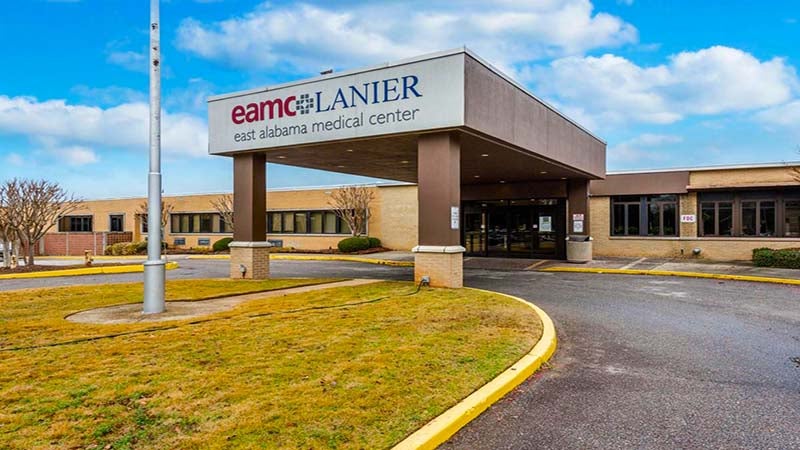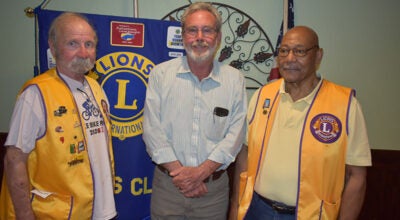Nichols talks COVID, EAMC commitment to Chambers County
Published 5:54 pm Tuesday, April 20, 2021
|
Getting your Trinity Audio player ready...
|
East Alabama Medical Center Executive Vice President/EAMC-Lanier Administrator Greg Nichols joined the Chambers County Commission on Monday to talk about how the past year has impacted EAMC-Lanier and EAMC as a group.
Nichols, who has over 20 years of hospital administration experience, the majority having been spent in facility management. He also has experience in the administration of disaster planning scenarios.
“I will tell you, this patch here has tested all of our abilities to do that,” Nichols said. “I think all the planning we’ve done in that past prepared us well for what we have with COVID, but yet, it was still a challenging year for us.”
Looking back on COVID this past year, Nichols pointed out that there were many firsts in the community and within the EAMC system.
“I know you remember back last March, we were one of the first communities that had a COVID outbreak.I did call it an outbreak because it was more than one person that spread in the cities and county,” Nichols said.
According to the Department of Public Health COVID dashboard, there have been over 3,500 confirmed positive cases and 122 deaths in Chambers County.
Nichols also pointed out that on March 19, 2020, EAMC had the first admission of a COVID positive patient.
“So, we were one of the first hospitals to have a COVID patient that was admitted,” Nichols said.
Nichols told the commission that EAMC leadership knew there was going to be a third peak, but it was unsure when that peak would hit.
“After the first admission, around April of last year, we got up to around 62 patients at one time in the hospital that were COVID, then it dropped down,” Nichols said. “So, in July of last year, we got up to 63 patients in the hospital at one time, and then it dropped again. We knew there was going to be a third peak coming and we just didn’t know when it was going to occur. But in mid-January of this year, we had 92 patients at one time in the hospital, which was a lot for us.”
All told, over the last year, both EAMC-Lanier and EAMC’s main campus cared for 1,425 inpatients that were COVID positive. Approximately, 26 percent of those patients were from Chambers County, Nichols said.
“Out of that 1,425, 367 are residents of Chambers County,” Nichols said.
Nichols talked about how because of the volume of patients EAMC cared for, they were one of the first hospitals in the state to roll out COVID testing. EAMC set up drive-through COVID testing sites both at Lanier in Valley and at its main campus in Opelika.
“We knew that was important for our community, and I am very proud that we stood that up so quickly to serve both Chambers County, Lee County and the surrounding counties,” Nichols said.
As of last week, Nichols said EAMC tested 54,411 people both in Chambers and Lee County. EAMC has spent an estimated $2.7 million on testing supplies. Nichols said testing has backed off a bit since there are more places throughout the county to be tested.
According to Nichols, EAMC was also one of the first in the state to offer the COVID vaccine.
“I will tell you I’m again very proud of what we’ve done there. As soon as we saw that there was a vaccine that was going to be available, we started planning, and started to see how we can deploy this? How can we get it to the most people, in the shortest amount of time?” Nichols said. Nichols credits Chambers County resident and EAMC Vice President of Support Services, Bruce Zartman, for having a great plan in place.
EAMC began administering vaccines in mid December with the thought that it could administer a couple hundred a day.
“We did that within the first couple of days and said ‘OK, state give us more.’ Then, we went to 500 a day, then went to 750 a day, and on up and on up. As of today, when I checked this morning, we had 1,528 vaccines scheduled at our clinic in Opelika and that serves Lee County, Chambers County and the surrounding area,” Nichols said.
He also added that people throughout the state and from other states get their vaccines through EAMC because of how they were able to efficiently manage the vaccination distribution.
EAMC was also one of the first hospital systems in the state to offer the vaccine to the school systems.
“We had a vaccine clinic on two Saturdays dedicated just to the Chambers County schools. And so the teachers were able to come down, bus drivers, janitors, anybody who worked in the school system could come, and we think it was around 50% percent of the employees at the school systems signed up to be vaccinated,” Nichols said. “We saw a need for our schools to be in session and in order for the teachers to feel safe, in order for others to feel safe, we wanted to roll out that vaccine to them, and we probably did it a little earlier than the governor wanted us to.”
As of Monday morning, Nichols said EAMC had administered 78,745 doses of the COVID vaccine. Nichols also noted that EAMC had the option to charge for administering the COVID-19 vaccine, however, chose not to do so.
“We could have billed for the administration of the vaccine. The vaccine itself was provided to us with no charge,” Nichols said. “We felt that if we had to register everybody that walked in the door, get the insurance information, it would slow the process down so much, it was more important to not bill in order to get more vaccines in arms.”
Nichols said by choosing not to bill, EAMC gave up $1.6 million in revenue.
As of Monday, approximately 34 percent of Chambers County residents have received at least one dose of the vaccine.
Nichols said the vaccine clinic is starting to wind down due to the drop in the number of people requesting the vaccine.
Without sounding an alarm, Nichols said the COVID inpatient count had dropped to six or seven, however, as of Monday that number had risen to 14. EAMC, Nichols says, is still watching that number closely.
Nichols also added several non-COVID related updates during his visit with the commission. First, he talked about the energy infrastructure project at the hospital over the last year.
“We’re replacing chillers, cooling towers, motors, some of our air handler units, and controls,” he said. “We’re going to spend within the next 15 months about $7 million at the campus at Lanier to replace and upgrade our energy system.”
The second non-COVID update Nichols discussed is the partnership with a local group of surgeons to open the ambulatory surgery center at EAMC-Lanier. Nichols says that pending the outcome or inspections, he hopes the surgery center will open some time this week.
“We should get the final letter this week and once they do, the group of surgeons from Opelika with Dr. Martin and Dr. Kamath, they’re going to bring their cases up to Lanier,” Nichols told the commission. “We were doing 1,000 surgery cases a year, and we hope to be doing between four and five thousand,” he added.
Next week, Nichols said renovations should be completed to the new geriatric psych facility and should open in October. The unit is for people who are typically 65 or older, either in a nursing home or at home but having mental health issues where they need oversight of a physician to get medicine or to be under the care of a psychiatrist. Nichols said they typically will stay 20 days or less, get the medicine regulated and then send them back to the nursing home or their home. The renovations have been in progress for about a year and cost EAMC an estimated $2 million.
Nichols wound down his presentation to the commission talking about the Ad Valorem Tax to support the hospital. Since its inception back in 2014 and through April 5, 2021, Ad Valorem brought in $8.7 million to support EAMC.
“It’s also very good to see that number is steadily going up a little bit each year, which means to me that the value of the property in our county is increasing because the percentage hasn’t changed,” Nichols said.
Since February 2014, EAMC has invested $17.6 million in capital since the Ad Valorem tax began.
Nichols wrapped up by giving the commission what he called a statement of continued partnership.
“You know, the tax proceeds that we receive each year, this $8.7 million that we received, the $1.3 million each year are very important to us, we cannot make it without that. That helps us provide that infrastructure and that other money we have we can continue to operate,” Nichols said. “COVID has been hard for us as an organization this year, we spent about $15 million more than what we received from the federal government. We spent about $15 million more than what we received from the federal government — that money to support hospitals — so we’ve had to make that up. We’ve had to find it somewhere, and we’ve done a good job with that. But still,you know, from a county commissioner standpoint and hospital standpoint, I appreciate the partnership that we had.”





